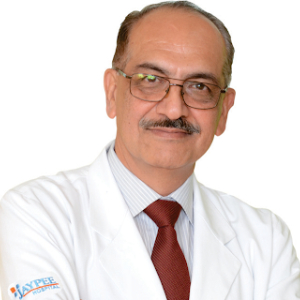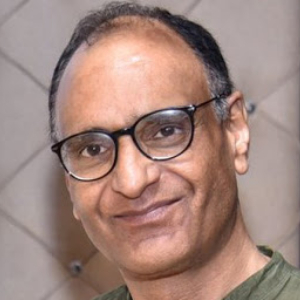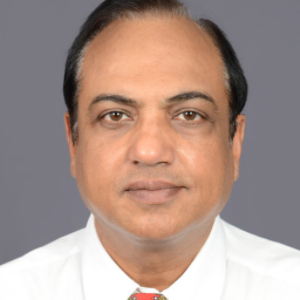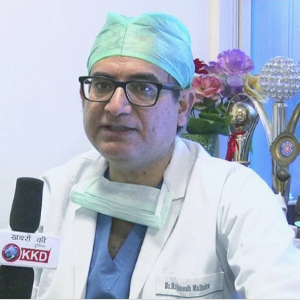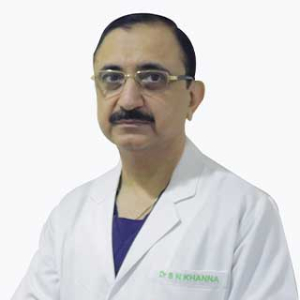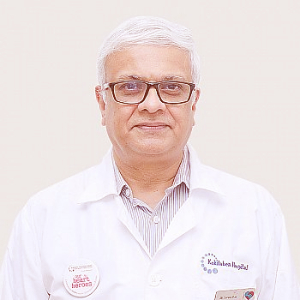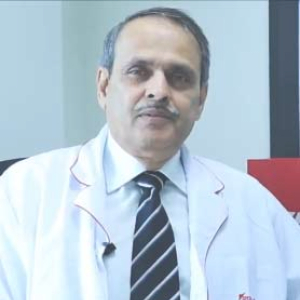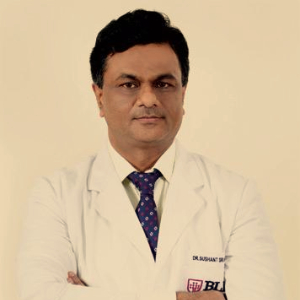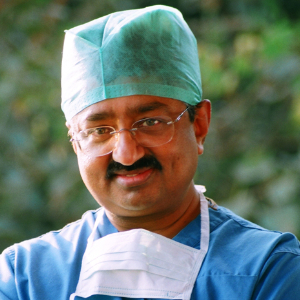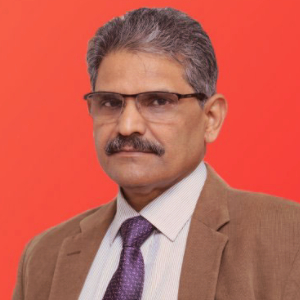Best Radiofrequency Ablation Doctors in India
- Cardiac Surgeon, Noida, India
- Over 30 years’ experience
Profile Highlights:
- Dr. Manoj Luthra is a highly experienced and renowned Cardiac surgeon who has 30+ years of experience and performed the first heart transplantation surgery in the Indian Armed Forces.
- Till date, Dr. Manoj Luthra has performed more than 12,000 cardiac surgeries including 8000 heart bypass surgeries. He has also performed many heart transplants and aneurysm surgeries.
- Cardiac Surgeon, Gurugram, India
- Over 30 years’ experience
Profile Highlights:
- Dr. Murtaza A Chishti is one of the most well-known and distinguished Cardio-Thoracic and Vascular surgeons in North India
- He has more than 3 decades of experience in the field of cardiac surgery with a specialization in heart and lung transplantation surgeries.
- He has performed more than 6000 cardiac procedures that include Total Arterial revascularization, aortic surgery, complex and re-operative coronary surgery, CABG, and several other cardiothoracic surgeries.
- Cardiac Surgeon, Mumbai, India
- Over 36 years’ experience
Profile Highlights:
- Dr. Nandkishore Kapadia is one of the leading Cardiothoracic and vascular surgeons in India excelling in heart and lung transplant surgeries.
- He has 36+ years of experience in the field during which he has performed over 10000 CABGs, 2000 heart valve repairs, and 800 minimally invasive cardiac surgeries.
- He has also performed more than 5000 open heart surgeries, 200 heart and lung transplant surgeries, and 150 VAD and ECMO implantation procedures.
- Cardio Thoracic & Vascular Surgeon, New Delhi, India
- Over 30 years’ experience
Profile Highlights:
- Dr. Rajneesh Malhotra is a distinguished cardiovascular and thoracic surgeon in India with over 30 years of experience.
- He is an expert in all kinds of cardiac surgeries with a special interest in Robotic Cardiac surgery along with minimally invasive cardiac surgery and other traditional heart surgeries.
- Dr. Rajneesh Malhotra has performed several complex and high-risk cases and also specializes in heart transplant surgeries and surgeries for heart failure.
- Cardiac Surgeon, New Delhi, India
- Over 26 years’ experience
Profile Highlights:
- Dr. Surendra Nath Khanna is a leading cardiovascular and thoracic surgeon specializing in minimally invasive cardiac surgeries, heart valve repairs, and heart failure surgeries.
- Dr. Surendra Khanna has 26+ years of experience in cardiac care and has performed more than 17000 surgeries that include beating heart surgery, mitral and aortic valve surgery, and double valve replacement surgery.
- His expertise lies primarily in adult cardiac surgeries and has done some of the most complex cardiac surgeries in India
- Pediatric Cardiac Surgeon, Mumbai, India
- Over 33 years’ experience
Profile Highlights:
- Dr. Suresh Rao is a highly experienced cardiac surgeon specializing in congenital heart diseases and has performed more than 12,000 surgeries for congenital heart diseases and disorders.
- Dr. Rao holds an extensive experience of over 33 years in Pediatric and congenital cardiac surgery and has performed numerous simple and complex heart defect surgeries with successful outcomes.
- Dr. Suresh Rao introduced the Modified Ultrafication procedure after congenital heart surgery in India and has used the procedure in the treatment of a large number of pediatric as well as adult patients.
- Cardiac Surgeon, Mumbai, India
- Over 30 years’ experience
Profile Highlights:
- Dr. Suresh V Joshi is a cardiac surgeon in Mumbai with expertise in undertaking complex surgeries as a result of congenital heart diseases.
- He holds an extensive experience of over 3 decades in cardiac surgery and specializes in Coronary Artery Bypass Grafting (CABG); specifically Beating Heart CABG and Minimally Invasive Cardiac Surgeries.
- He is an expert in all kinds of coronary and interventional cardiac procedures and has performed over 15,000 cardiac surgeries for different kinds of heart defects and disorders.
- Chairperson Heart & Lungs Transplant, New Delhi, India
- Over 20 years’ experience
Profile Highlights:
- Dr. Sushant Srivastava is a renowned cardiovascular and thoracic surgeon specializing in heart transplantation.
- He specializes in performing Beating Heart Bypass surgeries and is credited with performing the procedure on the oldest patient in India (96 years old). He also performed the first awake CABG in North India.
- He has taken up close to 10000 cardiac cases in his career and performed 3000+ cardiac surgeries related to Coronary Artery Bypass Grafting (CABG), redo coronary artery surgery, heart failure surgeries, heart valve surgeries, and various other types of cardiac surgeries.
- Cardiac Surgeon, Bengaluru, India
- Over 30 years’ experience
Profile Highlights:
- Dr. Vivek Jawali is a renowned Cardiothoracic and Vascular Surgeon in India and has performed more than 18,000 cardiothoracic and cardiovascular surgeries.
- He has several firsts to his credit that including the first beating heart bypass surgery in 1992 and the first Minimally Invasive Heart Bypass surgery in 1994 in India.
- He performed the first Awake Cardiac Surgery in 1999 which is done without general anesthesia or ventilator but under continuous high thoracic epidural. He also performed the first awake open heart surgery in the world without general anesthesia or ventilator on a 74-year-old patient for triple bypass with aortic valve replacement.
- Cardiac Surgeon, New Delhi, India
- Over 30 years’ experience
Profile Highlights:
- Dr. Yugal Kishore Mishra is a well-known cardiovascular and thoracic surgeon in Delhi specializing in Minimally Invasive and Robotic cardiac surgeries.
- He has 3 decades of experience in CTVS and has performed more than 19,000 open heart surgeries to date that including various types of minimally invasive cardiac procedures such as the port access approach for valve surgery and ASD closure.
- He is the founder of the Robotic Cardiac Surgery Program at Fortis Escorts Heart Institute where he has performed over 500 robotic cardiac surgeries.
Best Radiofrequency Ablation Hospitals in India
Radiofrequency Ablation
Radiofrequency Ablation is a minimally invasive procedure for destroying the nerve fibers that carry pain signals to your brain. It can provide relief to people who are suffering from chronic pain, especially in the lower back, neck or arthritis joints. If you are suffering from recurrent pain and you have experienced proper relief with a nerve block injection, you are likely a candidate for this procedure.
Also, termed as rhizotomy, this procedure uses heat for reducing or stopping the pain transmission. The procedure has several benefits, which include avoiding the need for surgery, immediate pain relief, very little recovery time, decreased need for pain medication, improved function as well as a quicker return to work and other activities.
Purpose
Radiofrequency ablation is able to help patients who are suffering from chronic low-back and neck pain, which is generally related to the degeneration of joints from arthritis.
The procedure is known to be quite safe and effective, with very few complications associated with it. However, the procedure is not suitable for everyone, such as people who have an active infection or bleeding problems. It is best to discuss with your doctor if you are a candidate for the procedure if you are considering it.
Preparation
Your doctor will first need to examine your medical history and previous imaging tests so that he/she can plan the best location for the ablation. If you have any questions, you should ask them to him/her.
Patients who take aspirin or a blood thinner may need to stop it for some days before the procedure is performed. It is best to discuss which medications you can stop and which ones you are able to continue.
Procedure
You will also need to take a few precautions for the treatment.
- Do not consume food within six hours of your appointment; however, you can have any clear liquids until two hours before the procedure is performed.
- If you are suffering from diabetes and use insulin, you will need to adjust the dosage of insulin on the day of your procedure. Your doctor will help you with this adjustment. Bring your diabetes medication with you so you will be able to take it after the procedure is complete. You should be able to take any other medications with a small sip of water unless your doctor recommended against taking them.
The procedure may or may not be performed using anesthesia. If anesthesia is not used, you will be awake and conscious during the procedure. First, you will need to lie on your stomach on the surgery table. If sedation is required, an IV line will be used for it.
Next, the skin over the treatment area is cleansed, so that any risk of infection is minimized. Then the physician numbs a small area of skin, by injecting a medicine for numbing the injection site.
Fluoroscopy might be used for directing the RFA needle towards the medial or lateral branch nerves. Once the needle tip is accurately placed, an active electrode is inserted through the needle. Then a small amount of electrical current is passed next to the target nerve, at a safe distance from the other nearby nerves.
After confirming the target nerve, a heat lesion is created using radiofrequency ablation. This process might be repeated for any additional nerves if required.
The procedure should not take over 90 minutes.
Aftercare & recovery
Generally, most patients are able to walk right after the procedure. After being monitored for a while, you are usually able to leave the office or hospital. You will need to book a cab or have a friend or family member drive you home.
Any pain from the procedure can last up to fourteen days, though this is generally due to the residual effects of the nerve ablation or muscle spasm. Within three days, you should be able to resume your daily activities. Though in around ten days, you should start seeing pain relief, sometimes, it might take around three weeks.
It is important for you to schedule a follow-up appointment with the doctor so that you are able to document the efficacy and address any remaining concerns that you might have for any future treatment or expectations.
Results
The pain relief should generally last from 9 months to over 2 years. If the nerve regrows through the burned lesion created by the procedure, the relief will last for 6-12 months.
If required, the procedure can be repeated.
Risks & complications
The risk of any complications from this procedure is generally low. Though infection and bleeding at the incision site are a possibility in some cases, they are quite uncommon.
Temporary side effects can include:
- Bruising and swelling at your incision site
- Weakness or numbness in the legs

